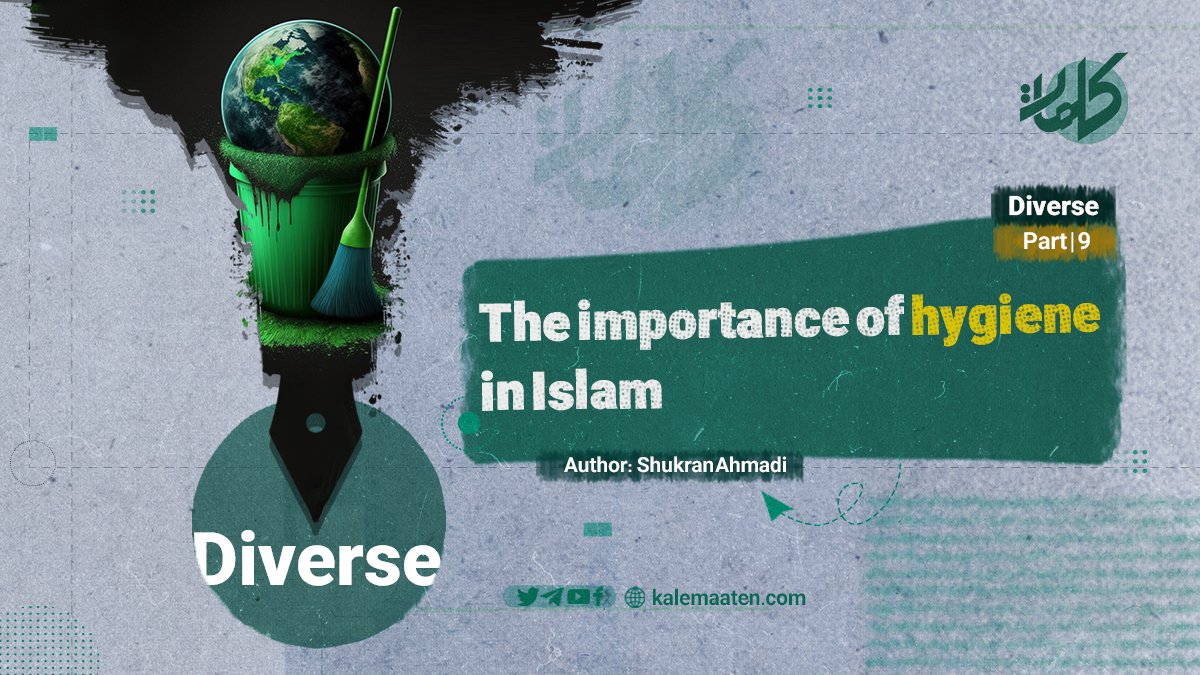Author: Shukran Ahmadi
The Importance of Hygiene in Islam (The 9th and Final Part)
Ruling on Treatment with Haram Things
Allamah Ibn Qayyim, may Allah have mercy on him, quoted from Imam Bukhari, may Allah have mercy on him, on the authority of Hazrat Abdullah bin Masoud, may Allah have mercy on him: “Indeed, Allah (S.W.T) has not placed your cure [for diseases] in what has been forbidden (Haram) to you.”
Forbidden substances, especially wine, have many harmful negative effects on the human brain; for this reason, in Islam, wine is called “Um al-Khabayes” (the mother of filth). Hippocrates, while discussing chronic and acute diseases, states: “The harm of wine to man is severe; it rises quickly and has an effect, and at the same time, with this effect, the mixture in the body rises towards the brain and becomes harmful to the mind.”
Carrion Eating
In the 20th century, microbiological and laboratory science has shown that there are types of microbes in the nose, mouth, throat, digestive system, and skin, which grow naturally without causing any harm and can even be beneficial in healthy individuals. Except in certain situations, such as disease and death, these microbes can become harmful. When blood circulation stops, microbes that thrive in an oxygen-free environment start to grow and multiply, spreading to most parts of the body within a few hours. Therefore, the least harm of consuming carrion is the poisoning of the digestive system.
Blood
Blood and lymph gland secretions are significant means of transferring various microbial, viral, and cancerous diseases to different parts of the body. Pork is a carrier of many viruses, the most dangerous of which include the Trichinella worms, which can penetrate the muscles of the body, eyes, and nose.
How beautifully Allah the Almighty states: “حُرِّمَتْ عَلَيْكُمُ الْمَيْتَةُ وَالدَّمُ وَلَحْمُ الْخِنزِيرِ …”; Translation: “The dead, the blood, and the flesh of the pig have been forbidden to you.”
Conclusion
This was a brief summary of the cleanliness and hygiene teachings of Islam, which hold extraordinary importance not found in other religions. All of this was stated fourteen hundred years ago, and mankind today has understood its significance to some extent. Scientists and laboratory experts have come to realize and are amazed by the scientific miracles, immortality, and truths of the Holy Quran and Islam.
Therefore, according to Islam, cleanliness is of utmost importance. All these health and hygiene directives demonstrate the mercy of Islam and the Prophet of Islam, may Allah bless him and grant him peace: “وَمَا أَرْسَلْنَاكَ إِلَّا رَحْمَةً لِّلْعَالَمِينَ”; “وَنُنَزِّلُ مِنَ الْقُرْآنِ مَا هُوَ شِفَاءٌ وَرَحْمَةٌ لِّلْمُؤْمِنِينَ”.
References
– The Holy Quran
– Jozi, Ibn Qayyim, *Al-Tebb al-Nabawi*, 2nd edition, 16 November 1957, Egypt, Cairo, Dar Ahya Al-Kotob al-Arabiya.
– Sharif, Dr. Adnan, *Men Al-Tebb Al-Qur’an*, Dar Al-Ilm Lemlayin, Beirut, Lebanon, 1999.
– Al-Sajestani, Abu Dawud Suleiman bin Al-Ashaath, *Sunan Abi Dawud*, publisher: Dar al-Kitab al-Arabi – Beirut.
– Alwan, Abdullah, *Raising Children in Islam*, Dar al-Salam: 181 AD, Beirut, Lebanon.
– Sanei, Dr. Safdar, *Health Teachings of Islam*, 4th edition, Jafari Bookstore.
– Al-Hosseini al-Zubaidi, Muhammad bin Muhammad bin Muhammad, *Ithaf al-Sadat al-Mutaqeen*, Dar al-Kotob al-Alamiya, Beirut, Lebanon.
– Al-Ghazali Al-Tusi, Abu Hamad Muhammad bin Muhammad, *Ihya Ulum al-Din*, Dar al-Marafah, Beirut, Lebanon.
– Abu al-Hussein, Muslim bin Hajjaj, Nishapuri, *Sahih al-Muslim*, Dar al-Kotob al-Alamiya, Beirut, Lebanon.
– Bukhari, Muhammad bin Ismail, *Al-Jamee al-Sahih Al-Bukhari*, Dar Ahya Al-Trath al-Arabi, Beirut, Lebanon.
– Al-Tabrizi, Al-Khatib Muhammad bin Abdullah, *Meshkat Al-Masabih*, 3rd edition, 1405, Publisher: Al-Mahab Al-Islami, Beirut, Lebanon.



